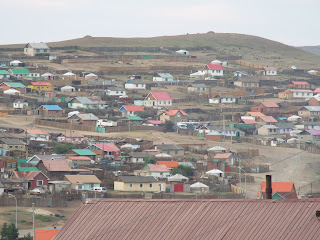I have been with my host family for one week now, and the M26 group is
officially finished with two weeks of PST (pre-service training). Time is very
weird in Peace Corps. It feels like it has been ages since Caleb and I were
sitting in the airport in Birmingham, waiting to head to San Francisco. At the
same time, time is going by quickly. It’s difficult to explain.
I have done a lot of things with my host family over the past week. I
helped plant cucumbers in their garden. I have observed and assisted with meal
preparations. I have taken a bath and washed clothes in a tunkin (sp?). I have
played some of the traditional Mongolian games, which I will explain in more
detail later when I have all the correct spelling and terminology to share. I
have watched Mongolian TV with my family, which has ranged from Mongolian horse
racing and wrestling to “So You Think You Can Dance” with Mongolian dubs. I
have gotten used to using a squat toilet.
And I have eaten. And eaten. And eaten. I think I have been doing a good
job of politely refusing when I simply can’t eat anymore, even though my family
always asks if I want seconds or they keep telling me to eat. I thought before
coming here that I would lose weight because I am not used to a heavy meat
based diet, but it seems like most of the host families are making sure that
doesn’t happen. The food I have been eating with my host family has been quite
good, despite the fact that I’m not used to eating steaming hot soup and
drinking hot tea when it is 80 degrees outside. I have been eating many
variations of soup, with cabbage, carrots, onions, rice, noodles, and meat, and
noodle or rice based dishes usually including those vegetables and pieces of
goat meat in a non-soup form. There are many variations of dumplings too, which
have been a favorite of mine. We had fried dumplings two nights ago that were
delicious. They had mostly green onions and little pieces of meat inside. Quite
good. Eggs are a favorite for breakfast, either boiled or fried with the yolk
not cooked all the way (forgive me egg enthusiasts, but I don’t know what this
is called). They have been feeding me well.
(Chicken cage, and view of community)
Another interesting thing I did with my host mom, sister, and brother
began with my sister telling me “We are going to pluck.” By this point, I had
been eating goat, sheep, and who knows what other type of meat. If I didn’t
mention in my previous post, my family has chickens. So, when my sister said
this, I thought “YES! We are having chicken tonight!!!” Alas, this did not mean
we would be killing and plucking a chicken. Instead, it meant we went outside
of our fence behind our house, which is where the cows graze, to collect dried
cow dung for fire fuel. My sister’s translator on her phone has been helpful
most of the time, but it was off with this one. Anyway, the view in this area
is amazing, especially during sunset. It took the four of us about half an hour
or so to fill up our containers.
During the week, I have been going to school. It is about a 10-15
minute walk, and there happens to be a significant sandy hill between my home
and school. I am still getting used to this, especially as the weather is
getting warmer. I am usually sweating a good bit by the time I get there. And
it isn’t just once a day, but twice. Our language class starts at 9am until
1pm, with breaks in between. At 1:00pm, we have to go home to eat lunch and be
back at the school by 2:30pm for our technical sessions. Eventually the hill
will be easy, right? Sure. Technical sessions have us learning Monday and
Wednesday-Friday about teaching English. We are also required to “micro-teach,”
which is where we will practice teaching to community members throughout PST.
On Tuesdays, we have cross cultural sessions where we learn about the Mongolian
culture.
(Sandy hill, and view to the west)
It has been almost a week since I’ve seen Caleb. We were luckily able
to see each other in Darkhan on Monday when we were getting our second series
of shots. I have missed him, but he is coming to my soum next weekend on
Saturday and will go back on Sunday. After that, it will be less than two weeks
before we see each other again in Darkhan for mid-center days, when the whole
group gets together for four days for more training.
Overall, I am doing very well. The language has been tough for me, but
I know I’ll get better over time. My family is very welcoming, and I have some
pretty amazing views of Mongolia. I have a feeling I am leaving some things
out, so please feel free to ask questions in the comments. There is much I am
still learning, and I am exciting about moving forward with becoming integrated
into the Mongolian culture.
~Sally









































